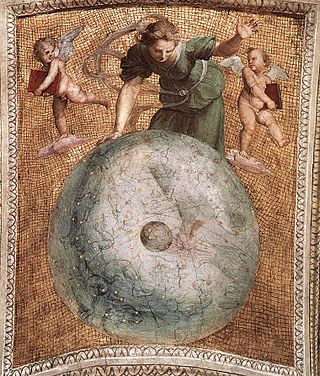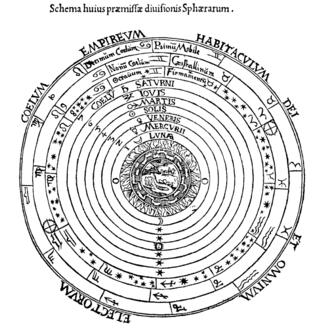Related Research Articles

Aristotle was an Ancient Greek philosopher and polymath. His writings cover a broad range of subjects spanning the natural sciences, philosophy, linguistics, economics, politics, psychology, and the arts. As the founder of the Peripatetic school of philosophy in the Lyceum in Athens, he began the wider Aristotelian tradition that followed, which set the groundwork for the development of modern science.
Reason is the capacity of consciously applying logic by drawing valid conclusions from new or existing information, with the aim of seeking the truth. It is associated with such characteristically human activities as philosophy, religion, science, language, mathematics, and art, and is normally considered to be a distinguishing ability possessed by humans. Reason is sometimes referred to as rationality.

Hylomorphism is a philosophical doctrine developed by the Ancient Greek philosopher Aristotle, which conceives every physical entity or being (ousia) as a compound of matter (potency) and immaterial form (act), with the generic form as immanently real within the individual. The word is a 19th-century term formed from the Greek words ὕλη and μορφή. Hylomorphic theories of physical entities have been undergoing a revival in contemporary philosophy.
Early Islamic philosophy or classical Islamic philosophy is a period of intense philosophical development beginning in the 2nd century AH of the Islamic calendar and lasting until the 6th century AH. The period is known as the Islamic Golden Age, and the achievements of this period had a crucial influence in the development of modern philosophy and science. For Renaissance Europe, "Muslim maritime, agricultural, and technological innovations, as well as much East Asian technology via the Muslim world, made their way to western Europe in one of the largest technology transfers in world history." This period starts with al-Kindi in the 9th century and ends with Averroes at the end of 12th century. The death of Averroes effectively marks the end of a particular discipline of Islamic philosophy usually called the Peripatetic Arabic School, and philosophical activity declined significantly in Western Islamic countries, namely in Islamic Spain and North Africa, though it persisted for much longer in the Eastern countries, in particular Persia and India where several schools of philosophy continued to flourish: Avicennism, Illuminationist philosophy, Mystical philosophy, and Transcendent theosophy.

Abu Nasr Muhammad al-Farabi, known in the Latin West as Alpharabius, was an early Islamic philosopher and music theorist. He has been designated as "Father of Islamic Neoplatonism", and the "Founder of Islamic Political Philosophy".

Logos is a term used in Western philosophy, psychology and rhetoric, as well as religion ; among its connotations is that of a rational form of discourse that relies on inductive and deductive reasoning.

Thomism is the philosophical and theological school which arose as a legacy of the work and thought of Thomas Aquinas (1225–1274), the Dominican philosopher, theologian, and Doctor of the Church.

On the Soul is a major treatise written by Aristotle c. 350 BC. His discussion centres on the kinds of souls possessed by different kinds of living things, distinguished by their different operations. Thus plants have the capacity for nourishment and reproduction, the minimum that must be possessed by any kind of living organism. Lower animals have, in addition, the powers of sense-perception and self-motion (action). Humans have all these as well as intellect.
Aristotle first used the term ethics to name a field of study developed by his predecessors Socrates and Plato which is devoted to the attempt to provide a rational response to the question of how humans should best live. Aristotle regarded ethics and politics as two related but separate fields of study, since ethics examines the good of the individual, while politics examines the good of the city-state, which he considered to be the best type of community.

The unmoved mover or prime mover is a concept advanced by Aristotle as a primary cause or "mover" of all the motion in the universe. As is implicit in the name, the unmoved mover moves other things, but is not itself moved by any prior action. In Book 12 of his Metaphysics, Aristotle describes the unmoved mover as being perfectly beautiful, indivisible, and contemplating only the perfect contemplation: self-contemplation. He also equates this concept with the active intellect. This Aristotelian concept had its roots in cosmological speculations of the earliest Greek pre-Socratic philosophers and became highly influential and widely drawn upon in medieval philosophy and theology. Thomas Aquinas, for example, elaborated on the unmoved mover in the Five Ways.

Nous, from Greek: νοῦς, is a concept from classical philosophy, sometimes equated to intellect or intelligence, for the faculty of the human mind necessary for understanding what is true or real.
Roland of Cremona was a Dominican theologian and an early scholastic philosopher. He was the first Dominican regent master at Paris, France (1229–1230). He was among the most enthusiastic of those who made use of the newly translated Aristotle in the early 13th century.
In psychology, the psyche is the totality of the human mind, conscious and unconscious. The English word soul is sometimes used synonymously, especially in older texts.
In medieval philosophy, the active intellect is the formal (morphe) aspect of the intellect (nous), according to the Aristotelian theory of hylomorphism. The nature of the active intellect was a major theme of late classical and medieval philosophy. Various thinkers sought to reconcile their commitment to Aristotle's account of the body and soul to their own theological commitments. At stake in particular was in what way Aristotle's account of an incorporeal soul might contribute to understanding of deity and creation.
Adam of Bockenfield was an English Franciscan philosopher, who taught at the University of Oxford in the early 1240s. He was an early commentator on a number of Aristotle's works, in particular those dealing with natural philosophy.
The philosophy of self examines the idea of the self at a conceptual level. Many different ideas on what constitutes self have been proposed, including the self being an activity, the self being independent of the senses, the bundle theory of the self, the self as a narrative center of gravity, and the self as a linguistic or social construct rather than a physical entity. The self is also an important concept in Eastern philosophy, including Buddhist philosophy.
Common sense is "knowledge, judgement, and taste which is more or less universal and which is held more or less without reflection or argument". As such, it is often considered to represent the basic level of sound practical judgement or knowledge of basic facts that any adult human being ought to possess. It is "common" in the sense of being shared by nearly all people. The everyday understanding of common sense is ultimately derived from historical philosophical discussions. Relevant terms from other languages used in such discussions include the aforementioned Latin, itself translating Ancient Greek κοινὴ αἴσθησις, and French bon sens. However, these are not straightforward translations in all contexts, and in English different shades of meaning have developed. In philosophical and scientific contexts, since the Age of Enlightenment the term "common sense" has been used for rhetorical effect both approvingly and disapprovingly. On the one hand it has been a standard for good taste, good sense, and source of scientific and logical axioms. On the other hand it has been equated to conventional wisdom, vulgar prejudice, and superstition.

Medieval philosophy is the philosophy that existed through the Middle Ages, the period roughly extending from the fall of the Western Roman Empire in the 5th century until after the Renaissance in the 13th and 14th centuries. Medieval philosophy, understood as a project of independent philosophical inquiry, began in Baghdad, in the middle of the 8th century, and in France and Germany, in the itinerant court of Charlemagne in Aachen, in the last quarter of the 8th century. It is defined partly by the process of rediscovering the ancient culture developed in Greece and Rome during the Classical period, and partly by the need to address theological problems and to integrate sacred doctrine with secular learning. This is one of the defining characteristics in this time period. Understanding God was the focal point of study of the philosophers at that time, Muslim and Christian alike.

The unity of the intellect, a philosophical theory proposed by the medieval Andalusian philosopher Averroes (1126–1198), asserted that all humans share the same intellect. Averroes expounded his theory in his long commentary on Aristotle's On the Soul to explain how universal knowledge is possible within the Aristotelian philosophy of mind. Averroes's theory was influenced by related ideas propounded by previous thinkers such as Aristotle himself, Plotinus, Al-Farabi, Avicenna and Avempace.

The search for a hypothetical soul and its location have been a subject of much speculation throughout history. In early medicine and anatomy, the location of the soul was hypothesized to be located within the body. Aristotle and Plato understood the soul as an incorporeal form but closely related to the physical world. The Hippocratic Corpus chronicles the evolution of thought that the soul is located within the body and is manifested in diseased conditions. Later, Galen explicitly used Plato's description of the incorporeal soul to physical locations in the body. The logical (λογιστικός) in the brain, the spirited (θυμοειδές) in the heart, and the appetitive (ἐπιθυμητικόν) in the liver. Da Vinci had a similar approach to Galen, locating the soul, or senso comune, as well as the imprensiva (intellect) and memoria (memory) in different ventricles of the brain. Today neuroscientists and other fields of science that deal with the body and the mind, such as psychology, bridge the gap between what is physical and what is incorporeal.
References
- ↑ Herbermann, Charles, ed. (1913). . Catholic Encyclopedia . New York: Robert Appleton Company.
- ↑ Aristotle, Ethics (1976) p. 88-90
- ↑ Aristotle, p. 218-222
- ↑ S. S. Hawi, Islamic Naturalism and Mysticism (1974) p. 151
- ↑ Faculties of the Soul
- ↑ John Calvin, Institutes of the Christian Religion (2008) p. 104
- ↑ R. Gregory, The Oxford Companion to the Mind (1987) p. 253-4